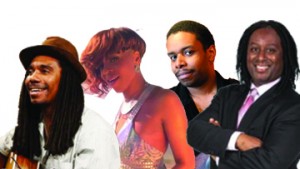
Julian Taylor, Ammoye Evans, Rudy Blair & Rich Brown
By Bill King
I asked eight immensely talented, successful and highly motivated community artists to give their impressions of the importance of February being designated Black History Month.
Here is what four said in their own words (part 1 appeared in the Feb. 18 Camera).
Julian Taylor (musician)
(Taylor is a Canadian singer-songwriter. Formerly associated with the band Staggered Crossing, he has continued to record and perform as a solo artist since that band’s breakup in 2007. He now fronts the Julian Taylor Band.)
I am an African / native Canadian and I was taught at a very young age that because of my heritage I would always have to give 150% more than was expected and that has stuck with me forever.
Not so long ago my grandparents were children of slaves and today there is a Black president. My grandfather witnessed that happen which is astonishing. My Aunt Zanana Akande was the first Black woman to ever serve as a cabinet minister in Canada. I’m so proud of that and of who I am and where I come from.
As a musician I refuse to use the excuse that I’m Black hold me back in anyway. It’s hard for anyone out there to make it. I do wish that people would let go of the need to put music into boxes though, and because of what I look like I’ve experienced a lot of stereotypical misleading.
Ammoye Evans (Reggae Artist of the Year 2015)
(Her career thus far has garnered several top awards including being a two-time Juno nominee and multi Best Female Vocalist and Reggae Artist accolades; most recently with the 2015 Reggae Exclusive Recognition Awards. In 2016, Ammoye officially released her debut Mixtape Enter the Warrioress.)
Canada is celebrating the 20th Anniversary of Black History Month. I celebrate the achievements and contributions of Black Canadians and all Blacks worldwide with Canada. The Black community throughout history have done a lot to make Canada what it is today; culturally diverse and a nation that welcomes all groups of people with no judgement of colour, culture, sex or religion.
I appreciate the initiative to remember and pay tribute in celebrating and bringing awareness to what the roles of Black Canadians is in our Canadian society and community.
Rudy Blair (media specialist – formerly 680 News)
(Blair was one of the first Black Canadians in a prominent role in broadcasting from 1993-2015 at 680 News and has an honorary degree from Humber College.)
As a kid growing up in Toronto there wasn’t a lot to identify when it came to Black history.
Yes, I had my family to look up to and there were newsmakers that you heard of like Martin Luther King, Malcolm X, Muhammad Ali, Ernie Ladd, Bobo Brazil (I was a big wrestling fan) The Harlem Globetrotters, The Jackson 5 and Soul Train but other than the odd TV documentary about civil rights that scared the hell out of me no one was teaching achievements when it came to Black History U.S. or Canada.
I can remember being taught about Italy because my class was mainly Italian but it didn’t teach me who I was. Today kids get to learn about all types of history and usually they get the “truth.” Black History Month isn’t just about learning facts but also taking pride and knowing you can achieve your goals no matter what.
Rich Brown: (bassist / composer)
(Brown has been an active member of Toronto’s culturally diverse music scene since 1992. Influences including Jaco Pastorius, Victor Bailey, Jimmy Haslip, and Alain Caron fuelled his passion for bass at age 17. He is touring around the globe with the band Samdhi led by New York-based sax-man Rudresh Mahanthappa.)
I completely understand the importance of Black History Month. As a Black male, I’m always taking opportunities to learn more about my background and my culture.
As cliche as it may sound, every month is Black History Month for me. My latest album Abeng is an acknowledgement of my background but it’s also an assertion that there needs to be a serious change when it comes to the overall status of Black people (the same should be said for women and visible minorities).
The problem with Black History Month is not Black History Month itself, it is its perception by those who choose to raise questions like “Why do we need a Black History Month?” or “Why don’t we have a white history month?” This attitude is divisive and only serves to perpetuate ignorance and intolerance when in actuality Black History Month should be seen as an invitation.


